第二十六届“韩素音青年翻译奖”竞赛原文
中英互译比赛原文
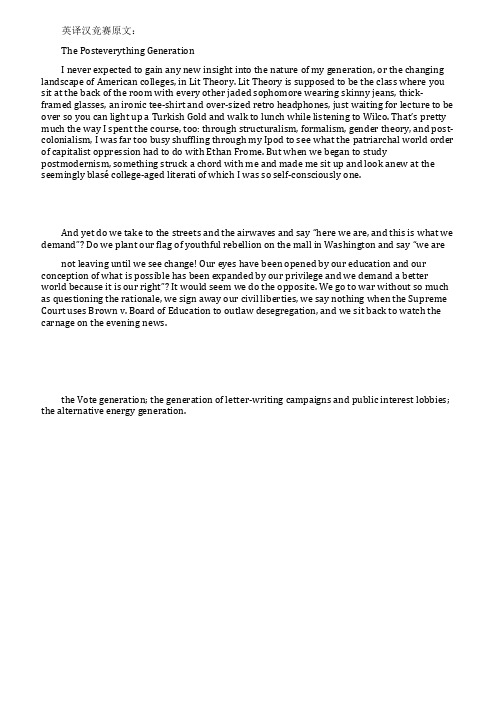
英译汉竞赛原文:The Posteverything GenerationI never expected to gain any new insight into the nature of my generation, or the changing landscape of American colleges, in Lit Theory. Lit Theory is supposed to be the class where you sit at the back of the room with every other jaded sophomore wearing skinny jeans, thick-framed glasses, an ironic tee-shirt and over-sized retro headphones, just waiting for lecture to be over so you can light up a Turkish Gold and walk to lunch while listening to Wilco. That’s pretty much the way I spent the course, too: through structuralism, formalism, gender theory, and post-colonialism, I was far too busy shuffling through my Ipod to see what the patriarchal world order of capitalist oppression had to do with Ethan Frome. But when we began to study postmodernism, something struck a chord with me and made me sit up and look anew at the seemingly blasé college-aged literati of which I was so self-consciously one.And yet do we take to the streets and the airwaves and say “here we are, and this is what we demand”? Do we plant our flag of youthful rebellion on the mall in Washington and say “we are not leaving until we see change! Our eyes have been opened by our education and our conception of what is possible has been expanded by our privilege and we demand a better world because it is our right”? It would seem we do the opposite. We go to war without so much as questioning the rationale, we sign away our civil liberties, we say nothing when the Supreme Court uses Brown v. Board of Education to outlaw desegregation, and we sit back to watch the carnage on the evening news.the Vote generation; the generation of letter-writing campaigns and public interest lobbies; the alternative energy generation.。
历届韩素音翻译大奖赛竞赛原文及译文
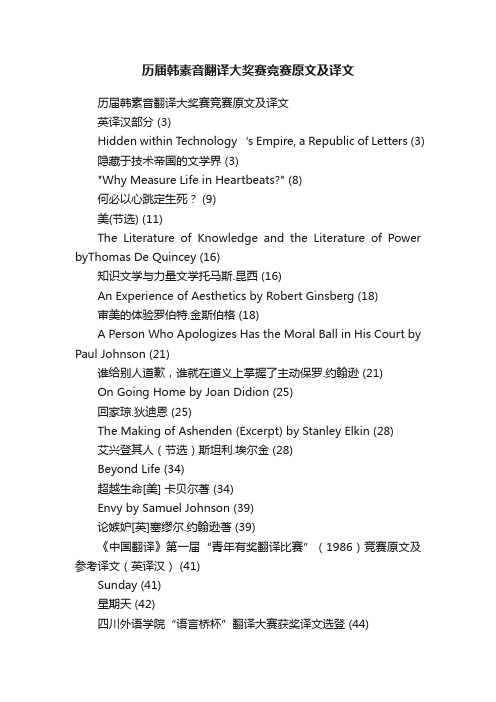
历届韩素音翻译大奖赛竞赛原文及译文历届韩素音翻译大奖赛竞赛原文及译文英译汉部分 (3)Hidden within Technology‘s Empire, a Republic of Letters (3)隐藏于技术帝国的文学界 (3)"Why Measure Life in Heartbeats?" (8)何必以心跳定生死? (9)美(节选) (11)The Literature of Knowledge and the Literature of Power byThomas De Quincey (16)知识文学与力量文学托马斯.昆西 (16)An Experience of Aesthetics by Robert Ginsberg (18)审美的体验罗伯特.金斯伯格 (18)A Person Who Apologizes Has the Moral Ball in His Court by Paul Johnson (21)谁给别人道歉,谁就在道义上掌握了主动保罗.约翰逊 (21)On Going Home by Joan Didion (25)回家琼.狄迪恩 (25)The Making of Ashenden (Excerpt) by Stanley Elkin (28)艾兴登其人(节选)斯坦利.埃尔金 (28)Beyond Life (34)超越生命[美] 卡贝尔著 (34)Envy by Samuel Johnson (39)论嫉妒[英]塞缪尔.约翰逊著 (39)《中国翻译》第一届“青年有奖翻译比赛”(1986)竞赛原文及参考译文(英译汉) (41)Sunday (41)星期天 (42)四川外语学院“语言桥杯”翻译大赛获奖译文选登 (44)第七届“语言桥杯”翻译大赛获奖译文选登 (44)The Woods: A Meditation (Excerpt) (46)林间心语(节选) (47)第六届“语言桥杯”翻译大赛获奖译文选登 (50)第五届“语言桥杯”翻译大赛原文及获奖译文选登 (52)第四届“语言桥杯”翻译大赛原文、参考译文及获奖译文选登 (54) When the Sun Stood Still (54)永恒夏日 (55)CASIO杯翻译竞赛原文及参考译文 (56)第三届竞赛原文及参考译文 (56)Here Is New York (excerpt) (56)这儿是纽约 (58)第四届翻译竞赛原文及参考译文 (61)Reservoir Frogs (Or Places Called Mama's) (61)水库青蛙(又题:妈妈餐馆) (62)中译英部分 (66)蜗居在巷陌的寻常幸福 (66)Simple Happiness of Dwelling in the Back Streets (66)在义与利之外 (69)Beyond Righteousness and Interests (69)读书苦乐杨绛 (72)The Bitter-Sweetness of Reading Yang Jiang (72)想起清华种种王佐良 (74)Reminiscences of Tsinghua Wang Zuoliang (74)歌德之人生启示宗白华 (76)What Goethe's Life Reveals by Zong Baihua (76)怀想那片青草地赵红波 (79)Yearning for That Piece of Green Meadow by Zhao Hongbo (79)可爱的南京 (82)Nanjing the Beloved City (82)霞冰心 (84)The Rosy Cloud byBingxin (84)黎明前的北平 (85)Predawn Peiping (85)老来乐金克木 (86)Delights in Growing Old by Jin Kemu (86)可贵的“他人意识” (89)Calling for an Awareness of Others (89)教孩子相信 (92)To Implant In Our Children‘s Young Hearts An Undying Faith In Humanity (92)心中有爱 (94)Love in Heart (94)英译汉部分Hidden within Technology’s Empire, a Republic of Le tters 隐藏于技术帝国的文学界索尔·贝娄(1)When I was a boy ―discovering literature‖, I used to think how wonderful it would be if every other person on the street were familiar with Proust and Joyce or T. E. Lawrence or Pasternak and Kafka. Later I learned how refractory to high culture the democratic masses were. Lincoln as a young frontiersman read Plutarch, Shakespeare and the Bible. But then he was Lincoln.我还是个“探索文学”的少年时,就经常在想:要是大街上人人都熟悉普鲁斯特和乔伊斯,熟悉T.E.劳伦斯,熟悉帕斯捷尔纳克和卡夫卡,该有多好啊!后来才知道,平民百姓对高雅文化有多排斥。
第十九届韩素音青年翻译奖参赛原文

第十九届韩素音青年翻译奖参赛原文英译汉部分:The Making of AshendenI’ve been spared a lot, one of the blessed of the earth, at least one of its lucky, that privileged handful of the dramatically prospering, the sort whose secrets are asked, like the hundred-year-old man. There is no secret, of course; most of what happens to us is simple accident. Highish birth and a smooth network of appropriate connection like a tea service written into the will. But surely something in the blood too, locked into good fortune’s dominant genes like a blast ripening in a time bomb. Set to go off, my good looks and intelligence, yet exceptional still, take away my mouthful of silver spoon and lapful of luxury. Something my own, not passed on or handed down, something seized, wrested—my good character, hopefully, my taste perhaps. What’s mine, what’s mine? Say taste—the soul’s harmless appetite.I’ve money, I’m rich. The heir to four fortunes. Grandfather on Mother’s side was a Newpert. The family held some good real estate in Rhode Island until they sold it for many times what they gave for it. Grandmother on Father’s side was a Salts, whose bottled mineral water, once available only through prescription and believed indispensable in the cure of all fevers, was the first product ever to be reviewed by the Food and Drug Administration, a famous and controversial case. The government found it to contain nothing that was actually detrimental to human beings, and it went public, so to speak. Available now over the counter, the Salts made more money from it than ever.Mother was an Oh. Her mother was the chemical engineer who first discovered a feasible way to store oxygen in tanks. And Father was Noel Ashenden, who though he did not actually invent the match-book, went into the field when it was still a not very flourishing novelty, and whose slogan, almost a poem,‘Close Cover Before Striking’(a simple stroke, as Father liked to say), obvious only after someone else has already thought of it (the Patent Office refused to issue a patent on what it claimed was merely an instruction, but Father’s company had the message on its matchbooks before his competitors even knew what was happening), removed the hazard from book matches and turned the industry and Father’s firm particularly into a flaming success overnight—Father’s joke, not mine. Later, when the inroads of Ronson and Zippo threatened the business, Father went into seclusion for six months and when he returned to us he had produced another slogan:‘For Our Matchless Friends.’It saved the industry a second time and was the second and last piece of work in Father’s life.There are people who gather in the spas and watering places of this world who pooh-pooh our fortune. Après ski, cozy in their wools, handsome before their open hearths, they scandal ize amongst themselves in whispers. ‘Imagine’, they say, ‘savedfrom ruin because of some cornball sentiment available in every bar and grill and truck stop in the country. It’s not, not...’Not what? Snobs! Phooey on the First Families. On railroad, steel mill, automotive, public utility, banking and shipping fortunes, on all hermetic legacy, morganatic and blockbuster blood-lines that change the maps and landscapes and alter the mobility patterns, your jungle wheeling and downtown dealing a stone’s throw from warfare. I come of good stock—real estate, mineral water, oxygen, matchbooks: earth, water, air and fire, the old elementals of the material universe, a bellybutton economics, a linchpin one.It is as I see it a perfect genealogy, and if I can be bought and sold a hundred times over by a thousand men in this country—people in your own town could do it, providents and trailers of hunch, I bless them, who got into this or went into that when it was eight cents a share—I am satisfied with my thirteen or fourteen million. Wealth is not after all the point. The genealogy is. That bridge-trick nexus that brought Newpert to Oh, Salts to Ashenden and Ashenden to Oh, love’s lucky longshots which, paying off, permitted me as they permit every human life! (I have this simple, harmless paranoia of the good-natured man, this cheerful awe.) Forgive my enthusiasm, that I go on like some secular patriot wrapped in the simple flag of self, a professional descendant, every day the closed-for-the-holiday banks and post offices of the heart. And why not? Aren’t my circumstances superb? Whose are better? No boast, no boast. I’ve had it easy, served up on all life’s silver platters like a satrap. And if my money is managed for me and I do no work—less work even than Father, who at least came up with those two slogans, the latter in a six-month solitude that must have been hell for that gregarious man (‘For Our Matchless Friends’: no slogan finally but a broken code, an extension of his own hospitable being, simply the Promethean gift of fire to a guest)—at least I am not ‘spoiled’ and have in me still alive the nerve endings of gratitude. If it’s miserly to count one’s blessings, Brewster Ashenden’s a miser.This will give you some idea of what I’m like:On Having an Account in a Swiss Bank: I never had one, and suggest you stay away from them too. Oh, the mystery and romance is all very well, but never forget that your Swiss bank offers no premiums, whereas for opening a savings account for 5,000 or more at First National City Bank of New York or other fine institutions you get wonderful premiums—picnic hampers, Scotch coolers, Polaroid cameras, Hudson’s Bay blankets from L. L. Bean, electric shavers, even lawn furniture. My managers always leave me a million or so to play wi th, and this is how I do it. I suppose I’ve received hundreds of such bonuses. Usually I give them to friends or as gifts at Christmas to doormen and other loosely connected personnel of the household, but often I keep them and use them myself. I’m not sti ngy. Of course I can afford to buy any of these things — and I do, I enjoy making purchases — but somehow nothing brings the joy of existence home to me more than these premiums. Something fromnothing — the two-suiter from Chase Manhattan and my own existence, luggage a bonus and life a bonus too. Like having a film star next to you on your flight from the Coast. There are treats of high order, adventure like cash in the street.Let’s enjoy ourselves, I say; let’s have fun. Lord, let us live in the sand b y the surf of the sea and play till cows come home. We’ll have a house on the Vineyard and a brownstone in the Seventies and a pied-à-terre in a world capital when something big is about to break. (Put the Cardinal in the back bedroom where the sun gilds the bay at afternoon tea and give us the courage to stand up to secret police at the door, to top all threats with threats of our own, the nicknames of mayors and ministers, the fast comeback at the front stairs, authority on us like the funny squiggle the counterfeiters miss.) Re-Columbus us. Engage us with the overlooked, a knowledge of optics, say, or a gift for the tides. (My pal, the heir to most of the vegetables in inland Nebraska, has become a superb amateur oceanographer. The marine studies people i nvite him to Wood’s Hole each year. He has a wave named for him.) Make us good at things, the countertenor and the German language, and teach us to be as easy in our amateur standing as the best man at a roommate’s wedding. Give us hard tummies behind the cummerbund and long swimmer’s muscles under the hound’s tooth so that we may enjoy our long life. And may all our stocks rise to the occasion of our best possibilities, and our humanness be bullish too.Speaking personally I am glad to be a heroic man.I am pleased that I am attractive to women but grateful I’m no bounder. Though I’m touched when married women fall in love with me, as frequently they do, I am rarely to blame. I never encourage these fits and do my best to get them over their derangements so as not to lose the friendships of their husbands when they are known to me, or the neutral friendship of the ladies themselves. This happens less than you might think, however, for whenever I am a houseguest of a married friend I usually make it a point to bring along a girl. These girls are from all walks of life—models, show girls, starlets, actresses, tennis professionals, singers, heiresses and the daughters of the diplomats of most of the nations of the free world. All walks. They tend, however, to conform to a single physical type, and are almost always tall, tan, slender and blond, the girl from Ipanema as a wag friend of mine has it. They are always sensitive and intelligent and good at sailing and the Australian crawl. They are never blemished in any way, for even something like a tiny beauty mark on the inside of a thigh or above the shoulder blade is enough to put me off, and their breaths must be as sweet at three in the morning as they are at noon. (I never see a woman who is dieting for diet sours the breath.) Arm hair, of course, is repellent to me though a soft blond down is now and then acceptable. I know I sound a prig. I’m not. I am—well, classical, drawn by perfection as to some magnetic, Platonic pole, idealism and beauty’s true North.。
翻译评析:第二十二届韩素音青年翻译奖竟赛汉译英译文和译文评析 1

幸福是什么模样,或许并不难回答。幸福就是一本摊开的诗篇,关于在城市的天空下,那些寻常巷陌的诗。
Perhaps it is not so difficult to define happiness after all. Happiness is an unfurled scroll of poems, describing ordinary alleys under the city skies.
蜗居在巷陌的寻常幸福
Simple Happiness of Dwelling in the Back Streets
隐逸的生活似乎在传统意识中一直被认为是幸福的至高境界。但这种孤傲遁世同时也是孤独的,纯粹的隐者实属少数,而少数者的满足不能用来解读普世的幸福模样。
A secluded life has traditionally been deemed, as it seems, the supreme state of happiness, although such aloofness and retirement breed loneliness as well. Few people in fact end up as genuine recluses, whose contentment does not suffice to construe what happiness is for all.
和来家中做客的邻居朋友用同一种腔调巧妙地笑谑着身边的琐事,大家眯起的眼睛都默契地闪着同一种狡黠;和家人一起围在饭桌前,衔满食物的嘴还发着含糊的声音,有些聒噪,但没人厌烦。
When neighbors and friends come, they share witty jokes about personal trivialities, implicitly understanding each other's eye movements of like astuteness. Family members sit around the dining table, chattering through mouthfuls of food, and no one is bothered by the noise.
第23届韩素音青年翻译奖竞赛参考译文2
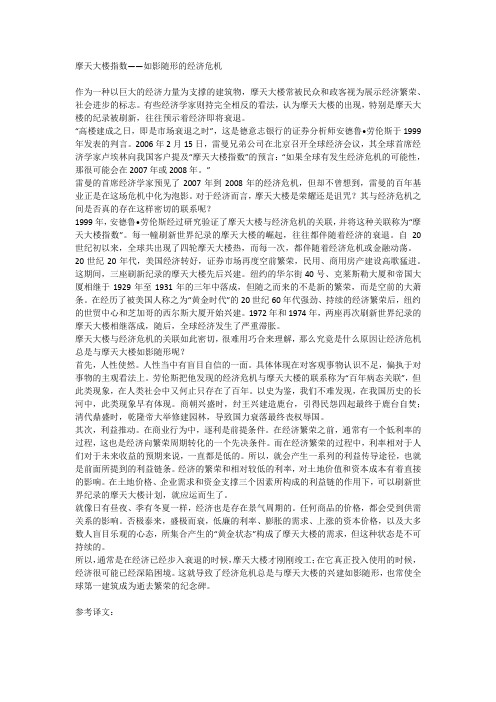
摩天大楼指数——如影随形的经济危机作为一种以巨大的经济力量为支撑的建筑物,摩天大楼常被民众和政客视为展示经济繁荣、社会进步的标志。
有些经济学家则持完全相反的看法,认为摩天大楼的出现,特别是摩天大楼的纪录被刷新,往往预示着经济即将衰退。
“高楼建成之日,即是市场衰退之时”,这是德意志银行的证券分析师安德鲁•劳伦斯于1999年发表的判言。
2006年2月15日,雷曼兄弟公司在北京召开全球经济会议,其全球首席经济学家卢埃林向我国客户提及“摩天大楼指数”的预言:“如果全球有发生经济危机的可能性,那很可能会在2007年或2008年。
”雷曼的首席经济学家预见了2007年到2008年的经济危机,但却不曾想到,雷曼的百年基业正是在这场危机中化为泡影。
对于经济而言,摩天大楼是荣耀还是诅咒?其与经济危机之间是否真的存在这样密切的联系呢?1999年,安德鲁•劳伦斯经过研究验证了摩天大楼与经济危机的关联,并将这种关联称为“摩天大楼指数”。
每一幢刷新世界纪录的摩天大楼的崛起,往往都伴随着经济的衰退。
自20世纪初以来,全球共出现了四轮摩天大楼热,而每一次,都伴随着经济危机或金融动荡。
20世纪20年代,美国经济转好,证券市场再度空前繁荣,民用、商用房产建设高歌猛进。
这期间,三座刷新纪录的摩天大楼先后兴建。
纽约的华尔街40号、克莱斯勒大厦和帝国大厦相继于1929年至1931年的三年中落成,但随之而来的不是新的繁荣,而是空前的大萧条。
在经历了被美国人称之为“黄金时代”的20世纪60年代强劲、持续的经济繁荣后,纽约的世贸中心和芝加哥的西尔斯大厦开始兴建。
1972年和1974年,两座再次刷新世界纪录的摩天大楼相继落成,随后,全球经济发生了严重滞胀。
摩天大楼与经济危机的关联如此密切,很难用巧合来理解,那么究竟是什么原因让经济危机总是与摩天大楼如影随形呢?首先,人性使然。
人性当中有盲目自信的一面。
具体体现在对客观事物认识不足,偏执于对事物的主观看法上。
第二十七届韩素音青年翻译比赛汉译英优秀奖的译文教学内容
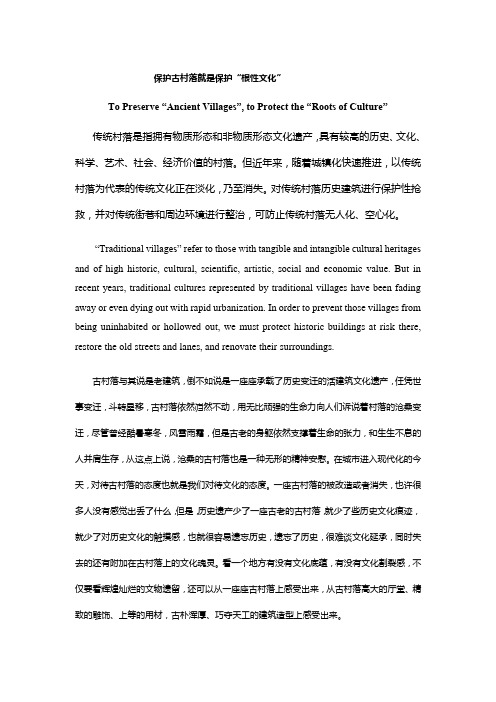
保护古村落就是保护“根性文化”To Preserve “Ancient Villages”, to Protect the “Roots of Culture”传统村落是指拥有物质形态和非物质形态文化遗产,具有较高的历史、文化、科学、艺术、社会、经济价值的村落。
但近年来,随着城镇化快速推进,以传统村落为代表的传统文化正在淡化,乃至消失。
对传统村落历史建筑进行保护性抢救,并对传统街巷和周边环境进行整治,可防止传统村落无人化、空心化。
“Traditional villages” refer to those with tangible and intangible cultural heritages and of high historic, cultural, scientific, artistic, social and economic value. But in recent years, traditional cultures represented by traditional villages have been fading away or even dying out with rapid urbanization. In order to prevent those villages from being uninhabited or hollowed out, we must protect historic buildings at risk there, restore the old streets and lanes, and renovate their surroundings.古村落与其说是老建筑,倒不如说是一座座承载了历史变迁的活建筑文化遗产,任凭世事变迁,斗转星移,古村落依然岿然不动,用无比顽强的生命力向人们诉说着村落的沧桑变迁,尽管曾经酷暑寒冬,风雪雨霜,但是古老的身躯依然支撑着生命的张力,和生生不息的人并肩生存,从这点上说,沧桑的古村落也是一种无形的精神安慰。
第25届韩素音翻译大赛汉翻英参考
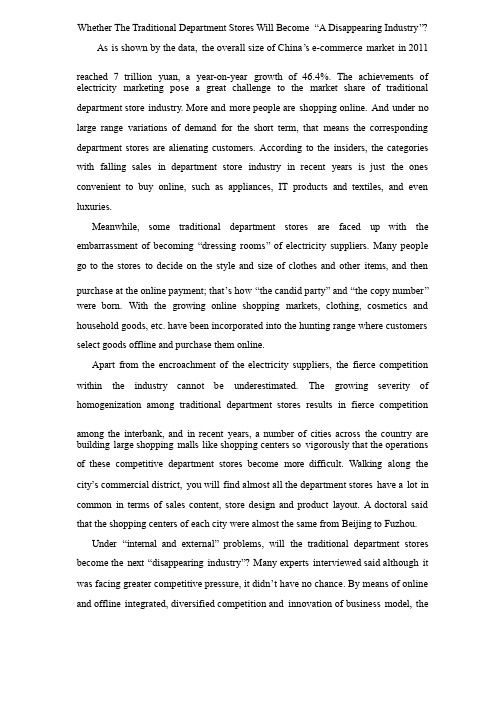
Whether The Traditional Department Stores Will Become “A Disappearing Industry A Disappearing Industry””?As is shown by the data, the overall size of China the overall size of China’’s e-commerce market in 2011 reached 7 trillion yuan, a year-on-year growth of 46.4%. The achievements of electricity marketing pose a great challenge to the market share of traditional department store industry industry. More and . More and more people are shopping online. And under no large range variations of demand for the short term, that means the corresponding department stores are alienating customers. According to the insiders, the categories with falling sales in department store industry in recent years is just the ones convenient to buy online, such as appliances, IT products and textiles, and even luxuries.Meanwhile, some traditional department stores are faced up with the embarrassment of becoming “dressing rooms rooms””of electricity suppliers. Many people go to the stores to decide on the style and size of clothes and other items, and then purchase at the online payment; that purchase at the online payment; that’’s how s how ““the candid party the candid party”” and and ““the copy number the copy number”” were born. With the growing online shopping markets, clothing, cosmetics and household goods, etc. have been incorporated into the hunting range where customers select goods offline and purchase them online.Apart from the encroachment of the electricity suppliers, the fierce competition within the industry cannot be underestimated. The growing severity of homogenization among traditional department stores results in fierce competition among the interbank, and in recent years, a number of cities across the country are building large shopping malls like shopping centers so vigorously that the operations of these competitive department stores become more difficult. Walking along the city city’’s commercial district, you will find almost all the department stores have a lot in common in terms of sales content, store design and product layout. A doctoral said that the shopping centers of each city were almost the same from Beijing to Fuzhou.Under “internal and external external””problems, will the traditional department stores become the next “disappearing industry industry”?”?Many experts interviewed said although it was facing greater competitive pressure, it didn was facing greater competitive pressure, it didn’’t have no chance. By means of online and offline integrated, diversified competition and innovation of business model, thedepartment store industry may achieve the success of “counter-attackcounter-attack””.electronic shock”” are As is informed, the department stores that have experienced “electronic shock minority. . Large department stores in Beijing have built their online not in the minoritye-commerce platforms. The e-commerce in Tianjin Department Store is now under plan of implement.At the same time, department stores should take the path of multi-position management and differentiated marketing, aiming at the targeted customer segments.A doctoral tutor emphasized that in spite of the more severe business environment the department stores had faced in recent years and the more fierce competition among electricity suppliers and large-scale commercial complexes, customer segments of the department stores were just billabong in a part. Department stores should pay more attention to the customer segments they own now, improve after-sale service and explore the personalized service for their customers.In addition, traditional department stores should take advantage of the momentum of development in shopping centers to transform. It It’’s understood that there exist certain corresponding patterns in the structures of the retail industry and per capita GDP. General merchandise stores dominate the market when per capita GDP ranges from $3,000 to $5,000 while shopping centers exclusive shops, specialty stores and convenience stores play a leading role when per capita GDP ranges from $5,000 to $10,000. However, the per capita GDP of our country has risen to more than $5,000 in 2011, so traditional department stores can be directed to the transformation to shopping centers at this time.。
第二十四届韩素音青年翻译奖竞赛参赛规则及原文

中国译协《中国翻译》编辑部与江苏人文环境艺术设计研究院(中国译协江苏培训中心)联合举办第二十四届韩素音青年翻译奖竞赛。
具体参赛规则如下:一、本届竞赛分别设立英译汉和汉译英两个奖项,参赛者可任选一项或同时参加两项竞赛。
二、《中国翻译》2012年第1期以及中国译协网()韩素音青年翻译奖专栏刊登竞赛规则、竞赛原文;参赛报名表请到中国翻译协会网站韩素音青年翻译奖专栏下载。
三、参赛者年龄:45岁以下(1967年1月1日后出生)。
四、参赛译文须独立完成,杜绝抄袭现象,一经发现,将取消参赛资格。
请参赛者在大赛截稿之日前妥善保存参赛译文,请勿在书报刊、网络等任何媒体公布自己的参赛译文,否则将被取消参赛资格并承担由此造成的一切后果。
五、参赛译文和参赛报名表格式要求:参赛译文应为WORD电子文档,中文宋体、英文Times New Roman字体,全文小四号字,1.5倍行距,文档命名格式为“XXX(姓名)英译汉”或“XXX(姓名)汉译英”。
参赛报名表文档命名格式为“XXX(姓名)英译汉参赛报名表”或“XXX(姓名)汉译英参赛报名表”。
译文正文内请勿书写译者姓名、地址等任何个人信息,否则将被视为无效译文。
每项参赛译文一稿有效,恕不接收修改稿。
六、参赛方式及截稿日期:请参赛者于2012年5月31日(含)前将参赛译文及参赛报名表以电子文档附件形式发送至hansuyin2012@,发送成功的文档得到自动回复后,请勿重复发送。
如需查询是否发送成功,可在6月10日至7月10日之间拨打电话(010)68997177。
本届竞赛不再接收打印稿。
七、参赛者在提交参赛译文后,交寄报名费50元,如同时参加两项竞赛,请交报名费 100元。
汇款地址:北京市阜外百万庄大街24号《中国翻译》编辑部,收款人:《中国翻译》编辑部,邮编:100037。
请在汇款单附言上注明“XXX(姓名)参赛报名费”字样。
未交报名费的参赛译文无效。
八、本届竞赛设一、二、三等奖和优秀奖若干名,一、二、三等奖获得者将被授予奖金、奖杯、证书和纪念品,优秀奖获得者将被授予证书和纪念品。
历届韩素音翻译大奖赛竞赛原文及译文详解
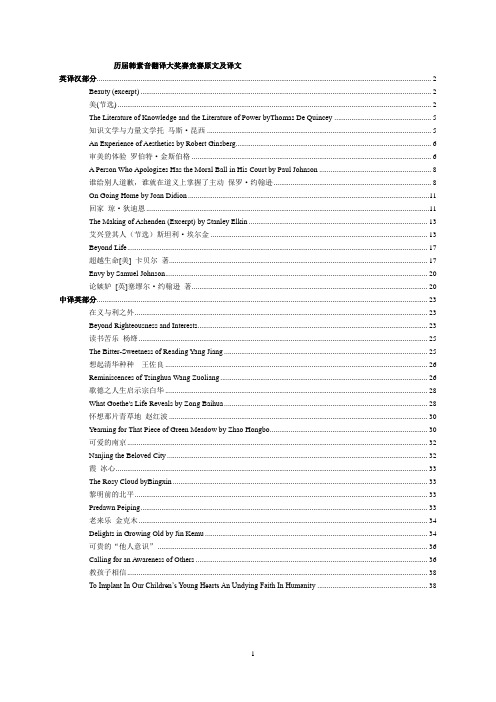
历届韩素音翻译大奖赛竞赛原文及译文英译汉部分 (2)Beauty (excerpt) (2)美(节选) (2)The Literature of Knowledge and the Literature of Power byThomas De Quincey (5)知识文学与力量文学托马斯.昆西 (5)An Experience of Aesthetics by Robert Ginsberg (6)审美的体验罗伯特.金斯伯格 (6)A Person Who Apologizes Has the Moral Ball in His Court by Paul Johnson (8)谁给别人道歉,谁就在道义上掌握了主动保罗.约翰逊 (8)On Going Home by Joan Didion (11)回家琼.狄迪恩 (11)The Making of Ashenden (Excerpt) by Stanley Elkin (13)艾兴登其人(节选)斯坦利.埃尔金 (13)Beyond Life (17)超越生命[美] 卡贝尔著 (17)Envy by Samuel Johnson (20)论嫉妒[英]塞缪尔.约翰逊著 (20)中译英部分 (23)在义与利之外 (23)Beyond Righteousness and Interests (23)读书苦乐杨绛 (25)The Bitter-Sweetness of Reading Yang Jiang (25)想起清华种种王佐良 (26)Reminiscences of Tsinghua Wang Zuoliang (26)歌德之人生启示宗白华 (28)What Goethe's Life Reveals by Zong Baihua (28)怀想那片青草地赵红波 (30)Yearning for That Piece of Green Meadow by Zhao Hongbo (30)可爱的南京 (32)Nanjing the Beloved City (32)霞冰心 (33)The Rosy Cloud byBingxin (33)黎明前的北平 (33)Predawn Peiping (33)老来乐金克木 (34)Delights in Growing Old by Jin Kemu (34)可贵的“他人意识” (36)Calling for an Awareness of Others (36)教孩子相信 (38)To Implant In Our Children’s Young Hearts An Undying Faith In Humanity (38)英译汉部分Beauty (excerpt)美(节选)Judging from the scientists I know, including Eva and Ruth, and those whom I've read about, you can't pursue the laws of nature very long without bumping撞倒; 冲撞into beauty. “I don't know if it's the same beauty you see in the sunset,”a friend tells me, “but it feels the same.”This friend is a physicist, who has spent a long career deciphering破译(密码), 辨认(潦草字迹) what must be happening in the interior of stars. He recalls for me this thrill on grasping for the first time Dirac's⑴equations describing quantum mechanics, or those o f Einstein describing relativity. “They're so beautiful,” he says, “you can see immediately they have to be true. Or at least on the way toward truth.” I ask him what makes a theory beautiful, and he replies, “Simplicity, symmetry .对称(性); 匀称, 整齐, elegance, and power.”我结识一些科学家(包括伊娃和露丝),也拜读过不少科学家的著作,从中我作出推断:人们在探求自然规律的旅途中,须臾便会与美不期而遇。
作品风格的翻译——以第十九届“韩素音青年翻译奖”参赛原文翻译(英译汉)为例

丁 说 ”,译 文 则 要 求 生 活化 、朴 素 、 臼然 、流 畅 ,体 现 口 :“
头 语 言特 征 。这 篇 文 章 主要 反映 了美 国 当代 生 活 , 以主 体 性
第 一 人称 叙 述 ,用 个 富 家子 弟 的 口吻叙 述 了一 个 家族 的暴
海》 (99 1 8 )将 其 定 义 为 “ 家 、艺 术 家 在创 作 巾所 表 现 出 富 型 发 家史 。作 者 通 篇运 用 面 语 与俚 语 央 杂 的 手法 , 以调 作
风 格无 法 翻 译 , 为 汉 两 种 语 言 在 表达 、构 词 、 语 法 、韵
侃 的语 气 把 他 “ 功 ”的原 冈归 结 为 好运 、庞 大 的 家族 关 系 成
网 以及 投 机 房 地 产 等 偶然 冈素 , 向读 者诉 衷 肠 。在 翻 译 的时
候 … 定要 避 免 用 过 分 华丽 的词 语 或 文 言词 句 ,不然 就 与 原 文 的 口语 味 道 浓 的 文 体 风 格 相 背 了 。试 举 参 赛 原 文 第 五 段 为 例 , 如 将 之译 成 : “ 谓 之非 ?纯系 势 利 小人 也 !吓 ,所 谓 何 之 第 一 家 庭 ,不 过 尔 尔 !他 如 铁 路 、 钢 厂 、汽 车 、 公 共 设 施 、银 行 与 航 运 所 赚之 利 ;秘 而 不宣 之 遗 产 , 凶联 姻 而 暴 富 者 势力 、声 誉 与 举 止之 变 化 ;如 此等 等 。 阁下 牟利 之 不 择 手
不 够 , 更 须 自 己走 入 原 作 中 ,和 书 中 人 物 一 哭 , ‘ 同
笑 … … 尚 须译 者 自己表 达 原作 风 格 的 一 副笔 墨 。 ”作家 各 有 各 的 风格 ,有 的纤 细 ,有 的粗 犷 ,有 的幽 默 含 蓄 ,有 的则 明
“韩素音青年翻译奖”竞赛汉译英之体感
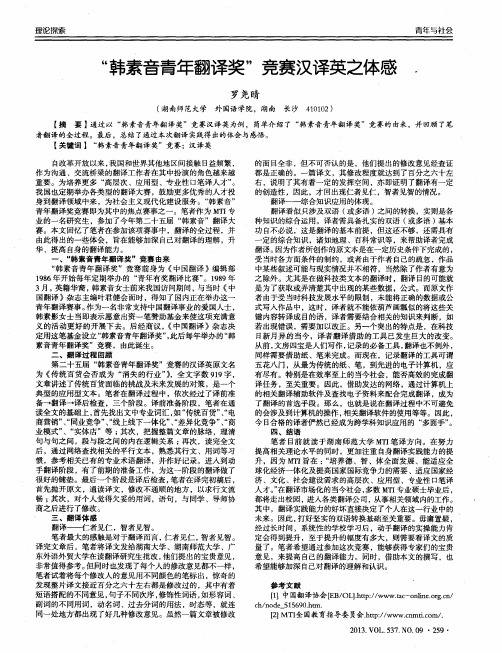
【 关键 词 】 “ 韩素音青年翻译 奖”竞赛 ;汉译英
自改革 开放以来 , 我 国和世界其他地 区间接触 日益频繁 , 作为沟通 、交 流桥梁的翻译工作者在其 中扮演 的角色越来越 重要 。为培养更 多 “ 高层次 、应用型 、专业性 口笔译 人才” 。 我 国也定期举办 各类 型的翻译大赛 ,鼓励更 多优 秀的人才投 身到翻译领域 中来 ,为社会主义现代化建设 服务 。“ 韩素音 ” 青年翻译奖竞赛 即为其 中的焦点赛 事之 一。笔者作为 M T I 专 业 的一名研究 生 ,参加了今年第二十五届 “ 韩 素音”翻译大 赛 。本文 回忆 了笔者 在参 加该项赛事 中 ,翻译 的全过程 ,并 由此得 出的一些 体会 ,旨在能够加深 自己对 翻译 的理解 ,升 华 、提高 自身 的翻泽能力 。 “ 韩素 音青年翻译奖”竞赛 由来 “ 韩 素音青年 翻译奖 ”竞赛前 身为 《 中国翻译 》编辑 部 1 9 8 6年 开始每年定期举办 的 “ 青 年有奖翻译 比赛 ” 。1 9 8 9年 3月 , 英籍华裔 , 韩 素音 女士前来 我国访 问期间 , 与 当时 《 中 国翻译 》杂 志主编叶君健会面 时 ,得 知了国 内正在举办这一 青年翻译赛事 。 作为一名非常支持 中国翻译事业 的爱 国人士 , 韩素影女 士当即表示 愿意 出资一笔赞助 基金来 使这项充满意 义 的活动更好 的开展 下去 。后 经商议 , 《中国翻译 》杂 志决 定用这笔基金设立 “ 韩素音青年翻译奖” , 此后每年举办的 “ 韩 素音青年翻译奖 ”竞赛 ,由此诞生 。
一
、
二 、 翻 译 过 程 回 顾
第二十五届 “ 韩素音青年 翻译 奖”竞赛 的汉译英原文名 为《 传 统百货 会否成 为 “ 消 失的行业 ” 》 ,全 文字数 9 1 9 字, 文章讲述 了传统 百货面临 的挑 战及未来 发展 的对策 ,是一个 典型 的应用 型文本。笔者在翻译过程 中 ,依 次经过了译前准 备一翻译—译 后检查 ,三个 阶段 。译前 准备 阶段 ,笔者在通 读全文 的基础上 , 首先找 出文 中专业词汇 , 如“ 传统百货 ” 、 “ 电 商营销 ” 、 “ 同业竞争 ” 、 “ 线上线下一体化 ” 、 “ 差异化竞争 ” 、 “ 商 业模式 ” 、“ 实体 店”等 ; 其次 ,把握整篇 文章的脉络 ,理清 句与句之 间 ,段 与段之间的 内在逻辑关 系 ; 再次 ,读完全文 后 ,通过 网络查 找相关的平行文本 ,熟悉其行 文 、用词等习 惯 ,参考相关 已有 的专业术语 翻译 ,并作好 记录。进 入到动 手翻译 阶段 , 有 了前 期的准备工作 , 为这一 阶段 的翻译做 了 很好的铺垫 。最后一个 阶段是译后检查 , 笔者在译完初稿后 , 首先抛开原 文 ,通读译文 ,修改不通顺 的地方 ,以求行文流 畅; 其次 ,对个人觉 得欠妥的用词 ,语句 ,与同学 、导师协 商之后进行 了修改 。 三、翻译体感 翻译— —仁者见仁 ,智者见智 。 笔 者最大的感触是对于翻译而言 , 仁者见仁 , 智者见智 。 译完文章后 ,笔者将译文发给湖南大学 、湖南师 范大学 、广 东外语外贸大学在读 翻译研究生批改 , 他们提 出的宝贵 意见 , 非常值得参考 。 但 同时也发现 了每个人 的修改 意见都不 一样 , 笔者试着将 每个 修改人的意见用不 同颜 色的笔标 出 ,惊奇 的 发现整片译 文接 近百分之六十左右都是修 改过的 ,其 中有着 短语搭配 的不 同意见 , 句子不 同次序 , 修饰性词语 , 如形容词 、 副词 的不 同用词 ,动名词 、过去分词 的用法 ,时态等 ,就连 同一处地方都 出现了好几种修改意见 。虽然 一篇 文章被修改
韩素音青年翻译奖竞赛原文

韩素音青年翻译奖竞赛原文第二十六届“韩素音青年翻译奖”竞赛原文英译汉竞赛原文:How the News Got Less MeanThe most read article of all time on BuzzFeed contains no photographs of celebrity nip slips and no inflammatory ranting. It’s a series of photos called “21 pictures that will restore your faith in humanity,”which has pulled in nearly 14 million visits so far. At Upworthy too, hope is the major draw. “This kid just died. What he left behind is wondtacular,”an Upworthy post about a terminally ill teen singer, earned 15 million views this summer and has raised more than $300,000 for cancer research.The recipe for attracting visitors to stories online is changing. Bloggers have traditionally turned to sarcasm and snark to draw attention. But the success of sites like BuzzFeed and Upworthy, whose philosophies embrace the viral nature of upbeat stories, hints that the Web craves positivity.The reason: social media. Researchers are discovering that people want to create positive images of themselves online by sharing upbeat stories. And with more people turning to Facebook and Twitter to find out what’s happening in the world, news stories may need to cheer up inorder to court an audience. If social is the future of media, then optimistic stories might be media’s future.“When we started, the prevailing wisdom was that snark ruled the Internet,”says Eli Pariser, a co-founder of Upworthy. “And we just had a really different sense of what works.”“You don’t want to be that guy at the party who’s crazy and angry and ranting in the corner —it’s the same for Twitteror Facebook,”he says. “Part of what we’re trying to d o with Upworthy is give people the tools to express a conscientious, thoughtful and positive identity in social media.”And the science appears to support Pariser’s philosophy. In a recent study from the Massachusetts Institute of Technology, researchers f ound that “up votes,”showing that a visitor liked a comment or story, begat more up votes on comments on the site, but “down votes”did not do the same. In fact, a single up vote increased the likelihood that someone else would like a comment by 32%, wherea s a down vote had no effect. People don’t want to support the cranky commenter, the critic or the troll. Nor do they want to be that negative personality online.In another study published in 2012, Jonah Berger, author of Contagious: Why Things Catch On and professor of marketing at the Wharton School of the University of Pennsylvania, monitored the most e-mailed stories produced by the New York Times for six months andfound that positive stories were more likely to make the list than negative ones.“What we share [or like] is almost like the car we drive or the clothes we wear,”he says. “It says something about us to other people. So people would much rather be seen as a Positive Polly than a Debbie Downer.”It’s not always that simple: Berger says that th ough positive pieces drew more traffic than negative ones, within the categories of positive and negative stories, those articles that elicited more emotion always led to more shares.“Take two negative emotions, for example: anger and sadness,”Berger says. “Both of those emotions would make the reader feel bad. But anger, a high arousal emotion, leads to moresharing, whereas sadness, a low arousal emotion, doesn’t. The same is true of the positive side: excitement and humor increase sharing, whereas conte ntment decreases sharing.”And while some popular BuzzFeed posts —like the recent “Is this the most embarrassing interview Fox News has ever done?”—might do their best to elicit shares through anger, both BuzzFeed and Upworthy recognize that their main success lies in creating positive viral material.“It’s not that people don’t share negative stories,”says Jack Shepherd, editorial director at BuzzFeed. “It just means that there’s ahigher potential for positive stories to do well.”Upworthy’s mission is to highlight serious issues but in a hopeful way, encouraging readers to donate money, join organizations and take action. The strategy seems to be working: barely two years after its launch date (in March 2012), the site now boasts 30 million unique visitors per month, according to Upworthy. The site’s average monthly unique visitors grew to 14 million people over its first six quarters —to put that in perspective, the Huffington Post had only about 2 million visitors in its first six quarters online.But Upworthy measures the success of a story not just by hits. The creators of the site only consider a post a success if it’s also shared frequently on social media. “We are interested in content that people want to share partly for pragmatic reasons,”Pariser s ays. “If you don’t have a good theory about how to appear in Facebook and Twitter, then you may disappear.”Nobody has mastered the ability to make a story go viral like BuzzFeed. The site, which began in 2006 as a lab to figure out what people share onlin e, has used what it’s learned to draw 60million monthly unique visitors, according to BuzzFeed. (Most of that traffic comes from social-networking sites, driving readers toward BuzzFeed’s mix of cute animal photos and hard news.) By comparison the New York Times website, one of the most popular newspaper sites on the Web,courts only 29 million unique visitors each month, according to the Times.BuzzFeed editors have found that people do still read negative or critical stories, they just aren’t the posts t hey share with their friends. And those shareable posts are the ones that newsrooms increasingly prize.“Anecdotally, I can tell you people are just as likely to click on negative stories as they are to click on positive ones,”says Shepherd. “But they’re m ore likely to share positive stories. What you’re interested in is different from what you want your friends to see what you’re interested in.”So as newsrooms re-evaluate how they can draw readers and elicit more shares on Twitter and Facebook, they may look to BuzzFeed’s and Upworthy’s happiness model for direction.“I think that the Web is only becoming more social,”Shepherd says. “We’re at a point where readers are your publishers. If news sites aren’t thinking about what it would mean for someone to share a story on social media, that could be detrimental.”汉译英竞赛原文:城市的迷失沿着瑗珲—腾冲线,这条1935年由胡焕庸先生发现并命名的中国人口、自然和历史地理的分界线,我们看到,从远距离贸易发展开始的那天起,利益和权力的渗透与分散,已经从根本结构上改变了城市的状态:城市在膨胀,人在疏离。
从“韩素音青年翻译奖”看英语题目的翻译
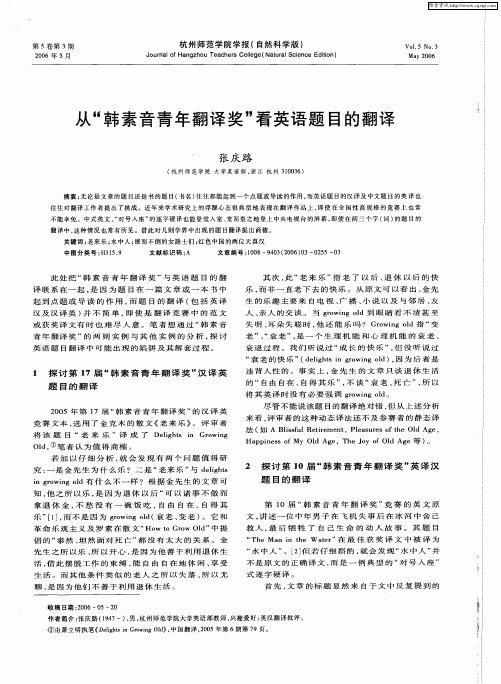
其 次 , “老 来 乐 ”指 老 了 以 后 、 休 以 后 的 快 此 退
乐 , 金
起 到 点 题 或 导 读 的 作 用 , 题 目 的 翻 译 ( 括 英 译 而 包 汉 及 汉 译 英 ) 不 简 单 , 使 是 翻 译 竞 赛 中 的 范 文 并 即
乐 ”[ ] 而 不 是 因 为 go n l 衰 老 、 老 ) 它 和 1, rwig od( 变 。 革 命 乐 观 主 义 及 罗 素 在 散 文 “ w t rw O d Ho oG o l ”中 提 倡 的 “ 然 、 然 面 对 死 亡 ” 没 有 太 大 的 关 系 。 金 泰 坦 都 文 , 述 一 位 中 年 男 子 在 飞 机 失 事 后 在 冰 河 中 舍 己 讲
2
探讨 第 1 O届 “ 素 音 青 年 翻 译 奖 ”英 译 汉 韩
题 目 的 翻 译
第 1 届 “ 素 音 青 年 翻 译 奖 ”竞 赛 的 英 文 原 0 韩
知 , 之 所 以 乐 , 因 为 退 休 以 后 “可 以 诸 事 不 做 而 他 是 拿 退 休 金 , 愁 没 有 一 碗 饭 吃 ,自 由 自 在 ,自 得 其 不
来 看 , 审 者 的 这 种 动 态 译 法 还 不 及 参 赛 者 的 静 态 译 评
法 ( A B i f l e i me t la u e f h d A e 如 l s t e n ,P e s r so e 0l g , su R r t Ha p n s fMy Ol e h o fO d Ag p i e so d Ag ,T e J y o l e等 ) 。
人 、 人 的 交 谈 。 当 go ig od到 眼 睛 看 不 清 甚 至 亲 rw n l 失 明 、 朵 失 聪 时 , 还 能 乐 吗 ? G o n l 指 “ 耳 他 rwigod 变 老 ”、 衰 老 ”, 一 个 生 理 机 能 和 心 理 机 能 的 衰 老 、 “ 是
第二十五届韩素英翻译大赛原文
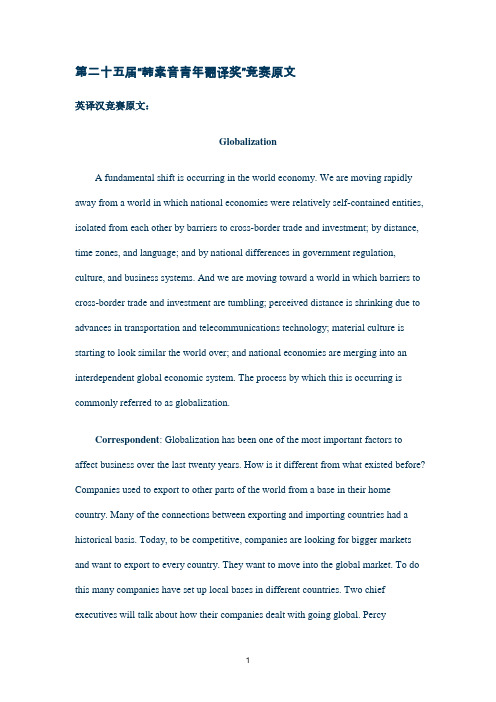
第二十五届“韩素音青年翻译奖”竞赛原文英译汉竞赛原文:GlobalizationA fundamental shift is occurring in the world economy. We are moving rapidly away from a world in which national economies were relatively self-contained entities, isolated from each other by barriers to cross-border trade and investment; by distance, time zones, and language; and by national differences in government regulation, culture, and business systems. And we are moving toward a world in which barriers to cross-border trade and investment are tumbling; perceived distance is shrinking due to advances in transportation and telecommunications technology; material culture is starting to look similar the world over; and national economies are merging into an interdependent global economic system. The process by which this is occurring is commonly referred to as globalization.Correspondent: Globalization has been one of the most important factors to affect business over the last twenty years. How is it different from what existed before? Companies used to export to other parts of the world from a base in their home country. Many of the connections between exporting and importing countries had a historical basis. Today, to be competitive, companies are looking for bigger markets and want to export to every country. They want to move into the global market. To do this many companies have set up local bases in different countries. Two chief executives will talk about how their companies dealt with going global. PercyBarnevik, one of the world’s most admired business leaders when he was Chairman of the international engineering group ABB and Dick Brown of telecommunications provider Cable & Wireless.Cable & Wireless already operates in many countries and is well-placed to take advantage of the increasingly global market for telecommunications. For Dick Brown globalization involves the economies of countries being connected to each other and companies doing business in many countries and therefore having multinational accounts.Dick Brown: The world is globalizing and the telecommunications industry is becoming more and more global, and so we feel we’re well-positioned in that market place. You see currency markets are more global tied, economies are globally connected, more so nowadays with expanded trade, more and more multinational accounts are doing business in many, many more countries. We’re a company at Cable & Wireless now, well-positioned to carry the traffic and to provide the services to more and more companies that now need to get to five countries or twelvec ountries, we’re often there.Correspondent: When Percy Barnevik became head of the international engineering group ABB, his task was to make globalization work. He decided to divide the business into over a thousand smaller companies. In this way he believed the company could be both global and local. In answering the question “How do you make globalization work?”, Percy Barnevik describes the “global glue” that keeps themany different people in ABB together. He then looks at the need to manage the three contradictions of company: it is decentralized but centrally controlled, it is big and small at the same time and it is both global and local.Percy Barnevik: We have now for ten years after our big merger created a “global glue” where people are tied together, where they don’t internally compete, but support each other, and you have global leaders with global responsibility and your local managers working with their profit centers, and if you have the right, so to say, agenda for these people and the right structure, you can use a scale of economy and your advantages of bigness but being small. We used to say you have three contradictions: decentralized and still centrally controlled, big and small, global and local, and, of course, to try to make these contradictions work together effectively, then I think you have a big organizational competitive edge.Correspondent: Globalizations can bring advantage to a business, but how does a company go global? Dick Brown mentions three ways companies can achieve “globalness”. Firstly, companies can work together in alliances. Secondly, they can acquire or buy other companies, and thirdly they can grow organically by expanding from their existing base.Dick Brown: Well, as you go global, and a handful or more of companies are going to really push out, in my view, to be truly global companies, and some of them, maybe all of them, will also work to be local. They’ll be local in chosen markets and global in their ability to carry their customers’ needs from continent A to c ontinent B.We want to be one of the companies that’s both global and local. Alliances are one way to be global, it’s not the only way to be global; you can acquire your way to “globalness”, you can organically grow your way to “globalness”, you can have alliances which help you get global quicker, so you take your pick.Percy Barnevik: You have to start from the top with local people who understand language, culture and so on, and I think in this global world where the East is coming up now, that’s a winni ng recipe.Correspondent: ABB already found the winning recipe. Its theory of globalization has become the company’s working practice. So how do you make theory work in practice? Percy Barnevik believes that successful globalization involves getting people to work together, overcoming national, cultural barriers and making the organization customer-driven.Percy Barnevik: You see the easy thing is to have the theory, but then to make the systems work, to make people really work together, to trust each other —Americans, Europeans, Asians, to get over these national cultural barriers and create a common glue, ABB, and then make them customer-driven. If you can achieve that, and create that culture deep down then I think you have an important competitive edge.Correspondent: What Dick Brown and Percy Barnevik have shown is that there are different routes to globalization and that companies have to work hard to succeed in going global. Actually one of the disadvantages of the Global Strategy is thatintegrated competitive moves can lead to the sacrificing of revenues, profits, or competitive positions in individual countries — especially when the subsidiary in one country is told to attack a global competitor in order to convey a signal or divert that competitor’s resources from another nation. The challenges managers of transnational corporations face are to identify and exploit cross-border synergies and to balance local demands with the global vision for the corporation. Building an effective transnational organization requires a corporate culture that values global dissimilarities across cultures and markets.汉译英竞赛原文:传统百货会否成为“消失的行业”数据显示,2011年中国电子商务市场整体交易规模达到7万亿元,同比增长46.4%。
第28届韩素音翻译比赛汉译英原文和参考译文(下)
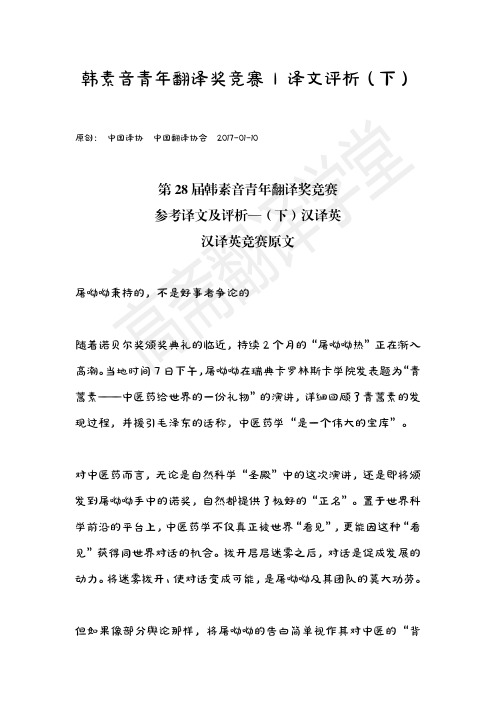
韩素音青年翻译奖竞赛 | 译文评析(下) 原创: 中国译协 中国翻译协会 2017-01-10第28届韩素音青年翻译奖竞赛参考译文及评析—(下)汉译英汉译英竞赛原文屠呦呦秉持的,不是好事者争论的随着诺贝尔奖颁奖典礼的临近,持续2个月的“屠呦呦热”正在渐入高潮。
当地时间7日下午,屠呦呦在瑞典卡罗林斯卡学院发表题为“青蒿素——中医药给世界的一份礼物”的演讲,详细回顾了青蒿素的发现过程,并援引毛泽东的话称,中医药学“是一个伟大的宝库”。
对中医药而言,无论是自然科学“圣殿”中的这次演讲,还是即将颁发到屠呦呦手中的诺奖,自然都提供了极好的“正名”。
置于世界科学前沿的平台上,中医药学不仅真正被世界“看见”,更能因这种“看见”获得同世界对话的机会。
拨开层层迷雾之后,对话是促成发展的动力。
将迷雾拨开、使对话变成可能,是屠呦呦及其团队的莫大功劳。
但如果像部分舆论那样,将屠呦呦的告白简单视作其对中医的“背书”,乃至将其成就视作中医向西医下的“战书”,这样的心愿固然可嘉,却可能完全背离科学家的本意。
听过屠呦呦的报告,或是对其研究略作了解就知道,青蒿素的发现既来自于中医药“宝库”提供的积淀和灵感,也来自于西医严格的实验方法。
缺了其中任意一项,历史很可能转向截然不同的方向。
换言之,在“诺奖级”平台上促成中西医对话之前,屠呦呦及其团队的成果,正是长期“对话”的成果。
而此前绵延不绝的“中西医”之争,多多少少都游离了对话的本意,而陷于一种单向化的“争短长”。
持中医论者,不屑于西医的“按部就班”;持西医论者,不屑于中医的“随心所欲”。
双方都没有看到,“按部就班”背后本是实证依据,“随心所欲”背后则有文化内涵,两者完全可以兼容互补,何必非得二元对立?屠呦呦在演讲中坦言,“通过抗疟药青蒿素的研究历程,我深深地感到中西医药各有所长,两者有机结合,优势互补,当具有更大的开发潜力和良好的发展前景”。
这既是站在中医药立场上对西方科学界的一次告白,反过来也可理解为西医立场上对中医拥趸们的提醒。
第十七届“韩素音青年翻译奖”赛(汉译英)中文原文及参考译文和解析
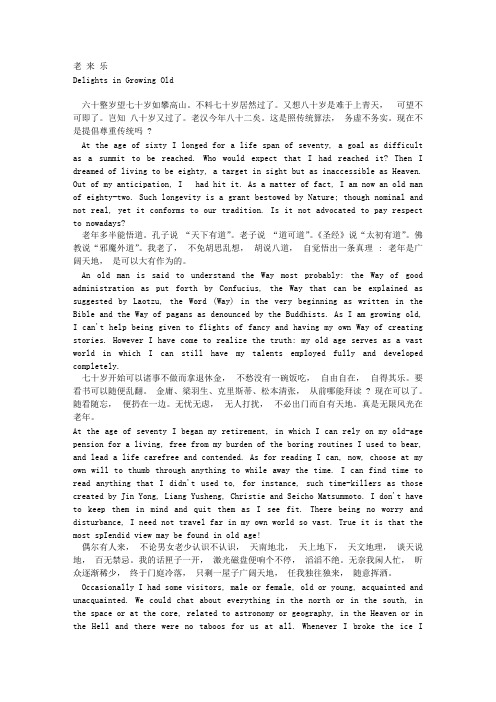
老来乐Delights in Growing Old六十整岁望七十岁如攀高山。
不料七十岁居然过了。
又想八十岁是难于上青天,可望不可即了。
岂知八十岁又过了。
老汉今年八十二矣。
这是照传统算法,务虚不务实。
现在不是提倡尊重传统吗 ?At the age of sixty I longed for a life span of seventy, a goal as difficult as a summit to be reached. Who would expect that I had reached it? Then I dreamed of living to be eighty, a target in sight but as inaccessible as Heaven. Out of my anticipation, I had hit it. As a matter of fact, I am now an old man of eighty-two. Such longevity is a grant bestowed by Nature; though nominal and not real, yet it conforms to our tradition. Is it not advocated to pay respect to nowadays?老年多半能悟道。
孔子说 “天下有道”。
老子说 “道可道”。
《圣经》说“太初有道”。
佛教说“邪魔外道”。
我老了,不免胡思乱想,胡说八道,自觉悟出一条真理 : 老年是广阔天地,是可以大有作为的。
An old man is said to understand the Way most probably: the Way of good administration as put forth by Confucius, the Way that can be explained as suggested by Laotzu, the Word (Way) in the very beginning as written in the Bible and the Way of pagans as denounced by the Buddhists. As I am growing old, I can't help being given to flights of fancy and having my own Way of creating stories. However I have come to realize the truth: my old age serves as a vast world in which I can still have my talents employed fully and developed completely.七十岁开始可以诸事不做而拿退休金,不愁没有一碗饭吃,自由自在,自得其乐。
第十二届“韩素音青年翻译奖”竞赛原文及参考译文(汉译英)
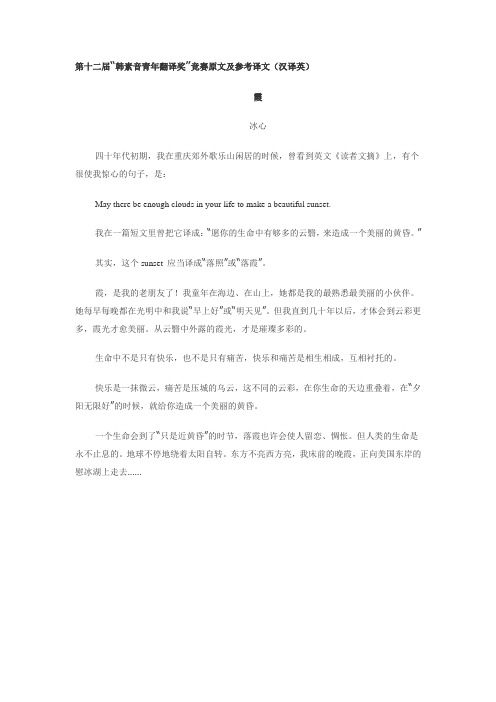
第十二届“韩素音青年翻译奖”竞赛原文及参考译文(汉译英)霞冰心四十年代初期,我在重庆郊外歌乐山闲居的时候,曾看到英文《读者文摘》上,有个很使我惊心的句子,是:May there be enough clouds in your life to make a beautiful sunset.我在一篇短文里曾把它译成:“愿你的生命中有够多的云翳,来造成一个美丽的黄昏。
”其实,这个sunset 应当译成“落照”或“落霞”。
霞,是我的老朋友了!我童年在海边、在山上,她都是我的最熟悉最美丽的小伙伴。
她每早每晚都在光明中和我说“早上好”或“明天见”。
但我直到几十年以后,才体会到云彩更多,霞光才愈美丽。
从云翳中外露的霞光,才是璀璨多彩的。
生命中不是只有快乐,也不是只有痛苦,快乐和痛苦是相生相成,互相衬托的。
快乐是一抹微云,痛苦是压城的乌云,这不同的云彩,在你生命的天边重叠着,在“夕阳无限好”的时候,就给你造成一个美丽的黄昏。
一个生命会到了“只是近黄昏”的时节,落霞也许会使人留恋、惆怅。
但人类的生命是永不止息的。
地球不停地绕着太阳自转。
东方不亮西方亮,我床前的晚霞,正向美国东岸的慰冰湖上走去……The Rosy CloudBingxinDuring the early 1940s I was living a retired life in the Gele Mountains in the suburbs of Chongqing (Chungking). One day, while reading the English language magazine Reader's Digest I found a sentence that touched me greatly. It read: "May there be enough clouds in your life to make a beautiful sunset."In a short article of mine, I quoted this sentence and translated it as "Yuan ni de shengming zhong you guo duo de yunyi, lai zaocheng yige meili de huanghun. " (literally: May there be enough clouds in your life to make a beautiful sunset.) *As I see it now, the word "sunset" in the English sentence should have been translated as luozhao (the glow at sunset) or luoxia (the rosy cloud at sunset), instead of dusk.She has been my dear old friend, the Rosy Cloud! She was my closest and most beautiful little companion when, in my childhood, I played on the beach or in the hills. Bathed in the brilliant sunshine, she would say to me "Good morning!" at dawn and "See you tomorrow!" at dusk. But not until several decades later did I come to realize that the more clouds there are the more beautiful the rays of sunlight will be, and the glow of the sun breaking through the clouds becomes most resplendent and colorful.Life contains neither unalloyed happiness nor mere misery. Happiness and misery beget, complement and set off each other.Happiness is a wisp of fleecy cloud; misery a mass of threatening dark cloud. These different clouds overlap on the horizon of your life to create a beautiful dusk for you when "the setting sun is most lovely indeed."**An individual's life must inevitably reach the point when "dusk is so near,"*** and the rosy sunset cloud may make one nostalgic and melancholy. But human life goes on and on. The Earth ceaselessly rotates on its axis around the sun. When it is dark in the east, it is light in the west. The rosy sunset cloud is now sailing past my window towards Lake Waban on the east coast of America ...*This sentence appears in Chinese and English in the article "For Young Readers Again, Newsletter No.4", written by Bing Xin in the Gele Mountains, on December 1, 1944.** and *** These two poetic lines are taken from a poem "On the Plain of Tombs" by Li Shangyin (813-858), a well-known poet of the Tang Dynasty (618-907). The two lines read like this: "The setting sun appears sublime, / But O! 'Tis near its dying time." (Tr. Xu Yuanchong) They imply that the setting sun has infinite beauty, but it is a pity that it is near the dusk, and the beautiful scene cannot last long. The two lines are often used to deplore the ephemeral nature of things, and to express the feelings at the loss of past glory and at the advent of old age.。
第二十四届 韩素音青年翻译奖竞赛译文
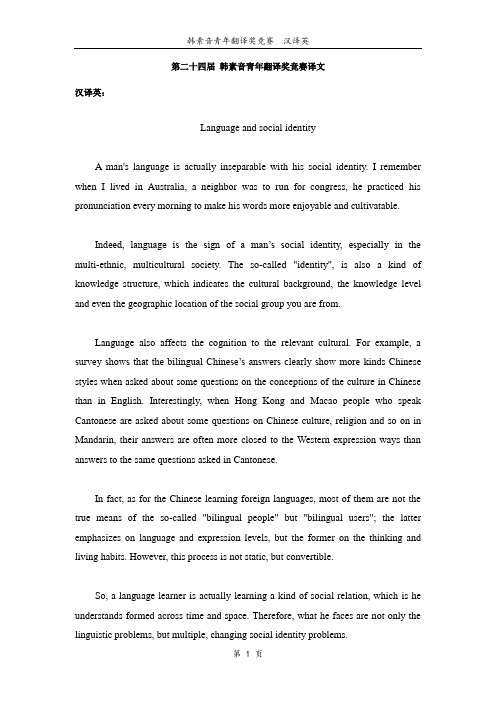
第二十四届韩素音青年翻译奖竞赛译文汉译英:Language and social identityA man's language is actually inseparable with his social identity. I remember when I lived in Australia, a neighbor was to run for congress, he practiced his pronunciation every morning to make his words more enjoyable and cultivatable.Indeed, language is the sign of a man’s social identity, especially in the multi-ethnic, multicultural society. The so-called "identity", is also a kind of knowledge structure, which indicates the cultural background, the knowledge level and even the geographic location of the social group you are from.Language also affects the cognition to the relevant cultural. For example, a survey shows that the bilingual Chinese’s answers clearly show more kinds Chinese styles when asked about some questions on the conceptions of the culture in Chinese than in English. Interestingly, when Hong Kong and Macao people who speak Cantonese are asked about some questions on Chinese culture, religion and so on in Mandarin, their answers are often more closed to the Western expression ways than answers to the same questions asked in Cantonese.In fact, as for the Chinese learning foreign languages, most of them are not the true means of the so-called "bilingual people" but "bilingual users"; the latter emphasizes on language and expression levels, but the former on the thinking and living habits. However, this process is not static, but convertible.So, a language learner is actually learning a kind of social relation, which is he understands formed across time and space. Therefore, what he faces are not only the linguistic problems, but multiple, changing social identity problems.Study also shows, a person’s language style is not fixed, but change with the social environment and the people he talks to. Generally speaking, individual language has a convergent tendency (i.e. follow the crowd), but sometimes also has a divergent tendency (i.e. show their own characteristics). For example, when I returned to Beijing, my “Beijing intonation"become strong clearly; but when my English friend was in Australia, his "British" was kept more obvious, I do not know if he was to show his identity purposely.In the process of adapting to foreign cultures, people’s attitudes towards their mother languages have a positive or negative choice. Some people who are actively involved in others’ mainstream cultures intend to weaken their ability of native language at the same time; however some people strengthen and highlight this ability considering it as an advantage.In g eneral, if a social group’s spoken and used language is respected by society (e.g. i n England, the noble’s language represented by the queen), will have higher social superiority, and its members will also show their difference in purpose to maintain its positive characteristics of the group. Of course, it’s inevitable that others draw close to the group’s language style.A person's language also can be an object of others’ judgment. According to a study, the social status, the education level, goodness or badness, intelligence, ability and even wealth can be judged from it.Thus, we can see clearly that the meaning of a person’s language. If the clothing is the body modification, language will be the external embodiment of a person’s comprehensive value. Therefore, language should not be only regarded as a tool, but a kind of quality.。
- 1、下载文档前请自行甄别文档内容的完整性,平台不提供额外的编辑、内容补充、找答案等附加服务。
- 2、"仅部分预览"的文档,不可在线预览部分如存在完整性等问题,可反馈申请退款(可完整预览的文档不适用该条件!)。
- 3、如文档侵犯您的权益,请联系客服反馈,我们会尽快为您处理(人工客服工作时间:9:00-18:30)。
第二十六届“韩素音青年翻译奖”竞赛原文来源:中国译协网英译汉竞赛原文:How the News Got Less MeanThe most read article of all time on BuzzFeed contains no photographs of celebrity nip slips and no inflammatory ranting. It’s a series of photos called “21 pictures that will restore your faith in humanity,” which has pulled in nearly 14 million visits so far. At Upworthy too, hope is the major draw. “This kid just died. What he left behind is wondtacular,” an Upworthy post about a terminally ill teen singer, earned 15 million views this summer and has raised more than $300,000 for cancer research.The recipe for attracting visitors to stories online is changing. Bloggers have traditionally turned to sarcasm and snark to draw attention. But the success of sites like BuzzFeed and Upworthy, whose philosophies embrace the viral nature of upbeat stories, hints that the Web craves positivity.The reason: social media. Researchers are discovering that people want to create positive images of themselves online by sharing upbeat stories. And with more people turning to Facebook and Twitter to find out what’s happening in the world, news stories may need to cheer up in order to court an audience. If social is the future of media, then optimistic stories might be media’s future.“When we started, the prevailing wisdom was that snark ruled the Internet,” says Eli Pariser, a co-founder of Upworthy. “And we just had a really different sense of what works.”“You don’t want to be that guy at the party who’s crazy and angry and ranting in the corner —it’s the same for Twitter or Facebook,” he says. “Part of what we’re trying to do with Upworthy is give people the tools to express a conscientious, thoughtful and positive identity in social media.”And the science appears to support Pariser’s philosophy. In a recent study from the Massachusetts Institute of Technology, researchers found that “up votes,” showing that a visitor liked a comment or story, begat more up votes on comments on the site, but “down votes” did not do the same. In fact, a single up vote increased the likelihood that someone else would like a comment by 32%, whereas a down vote had no effect. People don’t want to support the cranky commenter, the critic or the troll. Nor do they want to be that negative personality online.In another study published in 2012, Jonah Berger, author of Contagious: Why Things Catch On and professor of marketing at the Wharton School of the University of Pennsylvania, monitored the most e-mailed stories produced by the New York Times for six months and found that positive stories were more likely to make the list than negative ones.“What we share [or like] is almost like the car we drive or the clothes we wear,” he says. “It says something about us to other people. So people would much rather be seen as a Positive Polly than a Debbie Downer.”It’s not always that simple: Berger says that though positive pieces drew more traffic than negative ones, within the categories of positive and negative stories, those articles that elicited more emotion always led to more shares.“Take two negative emotions, for example: anger and sadness,” Berger says. “Both of those emotions would make the reader feel bad. But anger, a high arousal emotion, leads to more sharing, whereas sadnes s, a low arousal emotion, doesn’t. The same is true of the positive side: excitement and humor increase sharing, whereas contentment decreases sharing.”And while some popular BuzzFeed posts —like the recent “Is this the most embarrassing interview F ox News has ever done?” — might do their best to elicit shares through anger, both BuzzFeed and Upworthy recognize that their main success lies in creating positive viral material.“It’s not that people don’t share negative stories,” says Jack Shepher d, editorial director at BuzzFeed. “It just means that there’s a higher potential for positive stories to do well.”Upworthy’s mission is to highlight serious issues but in a hopeful way, encouraging readers to donate money, join organizations and take action. The strategy seems to be working: barely two years after its launch date (in March 2012), the site now boasts 30 million unique visitors per month, according to Upworthy. The site’s average monthly unique visitors grew to 14 million people over its first six quarters — to put that in perspective, the Huffington Post had only about 2 million visitors in its first six quarters online.But Upworthy measures the success of a story not just by hits. The creators of the site only consider a post a success if it’s also shared frequently on social media. “We are interested in content that people want to share partly for pragmatic reasons,”Pariser says. “If you don’t have a good theory about how to appear in Facebook and Twitter, then you may disappea r.”Nobody has mastered the ability to make a story go viral like BuzzFeed. The site, which began in 2006 as a lab to figure out what people share online, has used what it’s learned to draw 60 million monthly unique visitors, according to BuzzFeed. (Most of that traffic comes from social-networking sites, driving readers toward BuzzFeed’s mix of cute animal photos and hard news.) By comparison the New York Times website, one of the most popular newspaper sites on the Web, courts only 29 million unique visitors each month, according to the Times.BuzzFeed editors have found that people do still read negative or critical stories, they just aren’t the posts they share with their friends. And those shareable posts are the ones that newsrooms increasingly prize.“Anecdotally, I can tell you people are just as likely to click on negative stories as they are toclick on positive ones,” says Shepherd. “But they’re more likely to share positive stories. What you’re interested in is different from what you want your friends to see what you’re interested in.”So as newsrooms re-evaluate how they can draw readers and elicit more shares on Twitter and Facebook, they may look to BuzzFeed’s and Upworthy’s happiness model for direction.“I think that the Web is only becoming more social,” Shepherd says. “We’re at a point where readers are your publishers. If news sites aren’t thinking about what it would mean for someone to share a story on social media, that could be detrimental.”汉译英竞赛原文:城市的迷失沿着瑗珲—腾冲线,这条1935年由胡焕庸先生发现并命名的中国人口、自然和历史地理的分界线,我们看到,从远距离贸易发展开始的那天起,利益和权力的渗透与分散,已经从根本结构上改变了城市的状态:城市在膨胀,人在疏离。
